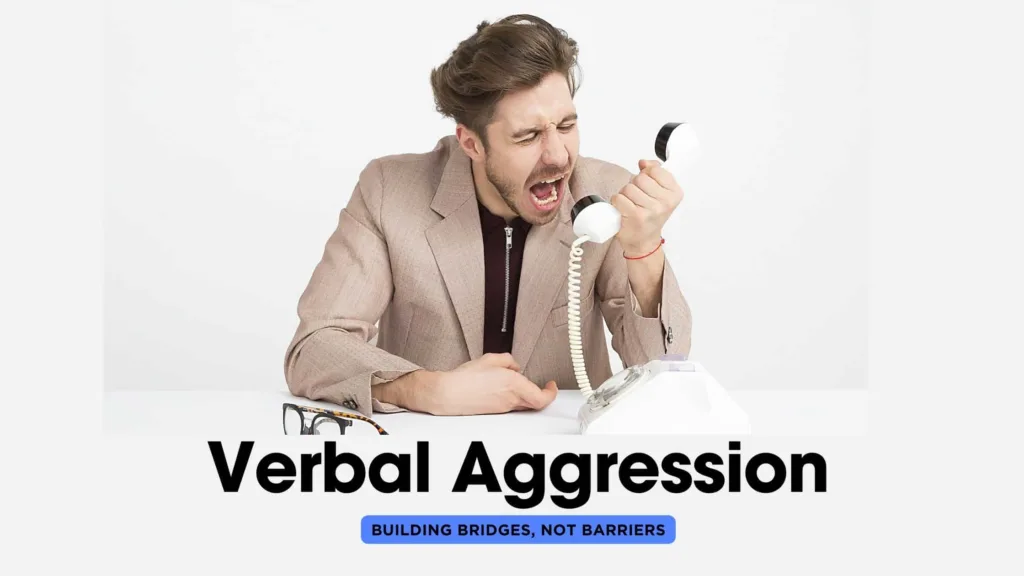Ever noticed how sometimes people use not-so-nice words when they talk? It happens a lot, and it can make chatting really tricky. Verbal aggression is when people use mean words, insults, or threats to communicate, and it can be really common and hurtful in how we talk to each other. This article wants to look into why people do this, how it affects individuals and relationships, and ways we can deal with it in a positive way. We’ll explore what causes verbal aggression, what happens because of it, and how we can handle it in a better and more helpful manner.
Definition and Types of Verbal Aggression
Verbal aggression is when people use unfriendly words, insults, or threats when they talk. This can happen in lots of different ways:
- Name-calling:
- This is when someone calls you names that are not nice, like saying “stupid” or “loser” to make you feel bad.
- Yelling:
- Yelling loudly and aggressively can be like shouting really harsh words, making it feel like you’re in trouble or something bad is happening.
- Sarcasm:
- Sarcasm is when someone says something but means the opposite. For example, if you made a mistake and someone said, “Wow, great job,” in a way that makes you feel like they’re making fun of you.
- Belittling remarks:
- Making someone feel small or not important can happen when someone says things that make you feel like you’re not as good as others. For instance, if you try to share your idea, and someone says, “That’s the dumbest thing I’ve ever heard.”

Causes of Verbal Aggression
- Feeling Stressed or Frustrated:
- Sometimes, when people feel too much stress or frustration, they might use not-so-nice words to let out their bad feelings.
- Also, if someone doesn’t feel good about themselves (low self-esteem), they might say not-so-nice things to feel more important.
- Trouble with Talking to Others:
- If someone isn’t good at talking with others, they might use not-so-nice talk to express themselves when they think others don’t get them.
- Not-so-nice talk can also happen when people misunderstand what someone else is trying to say.
- Family and Culture:
- How people talk can be influenced by how they grew up. If someone saw lots of not-so-nice talk in their family as a kid, they might do the same as they grow up.
- Also, the rules and expectations of a society or culture can affect how people use words. Sometimes, what’s okay to say in one place might not be okay in another.
Learn About: Relational Aggression: Silent Harm In Social Circles
Effects of Verbal Aggression
- How Words Affect People Personally:
- When someone uses not-so-nice words a lot, it can make others feel really bad inside. It can even lead to feeling very sad, worried, or really down.
- Hearing not-so-nice words all the time can also make someone feel not good about themselves. It’s like it takes away their belief in themselves and makes them less confident.
- How It Affects Relationships:
- Using not-so-nice talk can make relationships not good. It can cause problems and make it hard for people to trust each other.
- Sometimes, when someone keeps saying hurtful things, others might not want to be around them. This can make the person using not-so-nice words feel alone because others want to protect themselves from the hurtful behavior.
Coping Strategies:
- Getting Better at Talking to Others:
- Listening Well: When we encourage active listening, it means paying good attention to what others are saying. This helps us understand each other better and stops misunderstandings.
- Being Confident: Learning to be assertive means expressing ourselves in a strong and clear way without being mean. It helps us say what we want without using aggressive words.
- Fixing Problems and Disagreements:
- Talking with Help: If there’s a fight or problem, getting someone neutral (like a mediator) to help can make it better. They can guide the conversation so it’s more helpful.
- Setting Limits: Defining and respecting personal limits means saying what is okay and not okay. This helps prevent situations that might make someone use mean words.
- Professional Help When Needed:
- Talking to a Pro: Sometimes, talking to a counselor or therapist can help. They can understand why someone might be using mean words and teach better ways to handle feelings.
- Controlling Anger: Learning how to handle anger in a good way is important. It stops small problems from becoming big ones and helps in not using aggressive words.
Learn What is: Micro Cheating: The Subtle Toxin In A Relationship
Using mean words is a complicated thing with big reasons behind it and effects that touch many people. If we know why people use these words and use good ways to deal with it, we can talk better and have nicer relationships. It’s important for each person and for everyone together to fix this, so we can make a kind and supportive world.

Pingback: Overt Aggression: The Aggression Chronicle
Pingback: Evaluation Apprehension Psychology: Assessment Anxiety